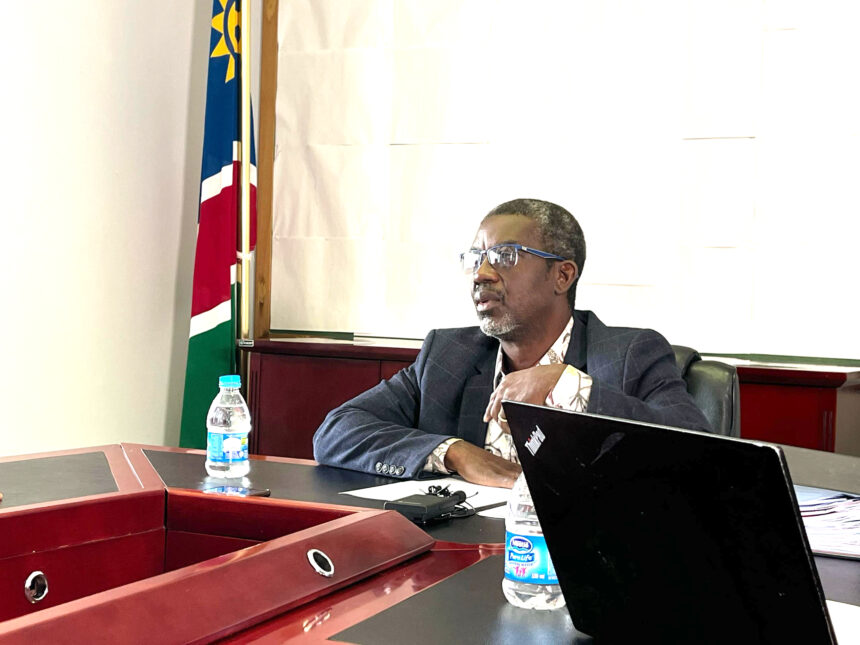Authorities in Botswana are investigating potential corruption around the failed attempt by Namibia and Botswana to host the 2027 Africa Cup of Nations (AFCON).
Dubbed ‘BONA’ – the first two letters of each country’s name – it never materialised after Namibia pulled out at the 11th hour, citing financial constraints.
Namibia abruptly withdrew due to a lack of proper financial benchmarks and the submission of questionable figures.
However, it has now emerged that funds associated with the bid may have ended up in individual pockets.
At a press conference yesterday, sport executive director Mbumba Haitengela addressed the controversy.
The ambitious joint bid between Namibia and Botswana was supposed to put both countries at the forefront of African football, with the 2027 Afcon representing a significant opportunity to showcase their sporting infrastructure and attract tourism opportunities.
At the time, the Namibian government cited concerns over “thumb-sucked and not benchmarked figures” in the bid documents, especially regarding the costs related to the involvement of a lead consultant South African company, Ruben Reddy Architects.
They were hired hastily by the Botswana Sports Commission’s Procurement Unit to produce a bid book as well as a facilities audit for the tournament.
However, the costs of these services increased from the initial N$7.6 million to close to N$46 million – a 40% share which Namibia had to give (60% was then to be covered by Botswana). This left the Namibian government with serious doubts about the financial viability of the bid. “This is the time people must thank me for saving our government from that fiasco. I stood my ground and drafted a letter for us to pull out of that arrangement,” Haitengela said when questioned about the failed joint bid.
Despite Namibia’s exit from the process, the bid continued without them, with Botswana proceeding alone to place a solo bid for the prestigious tournament. However, the controversy did not end there.
Recently, it has come to light that Botswana’s anti-graft body, the Directorate on Corruption and Economic Crime (DCEC), is set to visit Namibia in the coming days to investigate the circumstances surrounding the failed bid, which saw nearly N$90 million in public funds vanish into thin air without a trace.
The investigation will focus particularly on the inflated costs of the bid. When asked why Botswana was investigating Namibia’s role in the bid despite its withdrawal, Haitengela had no knowledge of that, and was not even aware of the DCEC’s visit.
Asked if they informed their partners then of their concerns with the inflated money, he asked, “Why should we?” In response to rumours suggesting the existence of a joint BONA bank account, Haitengela clarified, “We didn’t have a joint BONA bank account; we have our own internal account which we have been using to pay our local BONA-related expenses.” These expenses include accommodation, subsistence and travel allowances, which amounted to the N$4.6 million from the N$12 million Namibia had budgeted.
He added that all the money left (N$7.4 million) from the collapsed deal, on Namibia’s end, returned to the government.
“We learnt a lesson on how to approach these things, and to be better in terms of preparation,” Haitengela said.
He added that a facility report which came out of this exercise is currently being used.
The controversy surrounding the failed bid has sparked a wider debate on transparency and accountability in government spending.
Former sport minister Agnes Tjongarero also weighed in on the matter, revealing that Namibia’s withdrawal stemmed from the questionable figures presented in the bid documents, which lacked proper benchmarking.
She suggested that a bank account had been opened by the pre-bid committee, where both Namibia and Botswana were supposed to deposit funds to cover the bid’s costs.
However, she expressed uncertainty over whether the money was ever returned to the Namibian government’s coffers, or if Botswana received their portion of the funds back after the partnership collapsed.
The fallout from this failed bid has likewise raised alarm about the broader financial implications of hosting such a large-scale tournament. Namibia and Botswana’s original plans to jointly host the 2027 AFCON would have required substantial investment in infrastructure, with reports suggesting the overall cost of hosting the event could have exceeded N$13 billion. Namibia would have spent close to N$4.8 billion to upgrade their sport facilities, and to construct new facilities in time for the competition.
On top of that, the country was advised that they would need to support infrastructure like airports, roads, hotels, IT and broadcasting, amongst others. Concerns over alleged reckless spending and the potential for corruption have prompted Botswana’s Parliament to approve a motion for a full investigation into the entire bid process, including the costly bid book, which has been one of the main points of contention. Kenya, Uganda and Tanzania were eventually awarded the hosting rights for the 2027 AFCON.
-Additional reporting by Tuesday Grill


